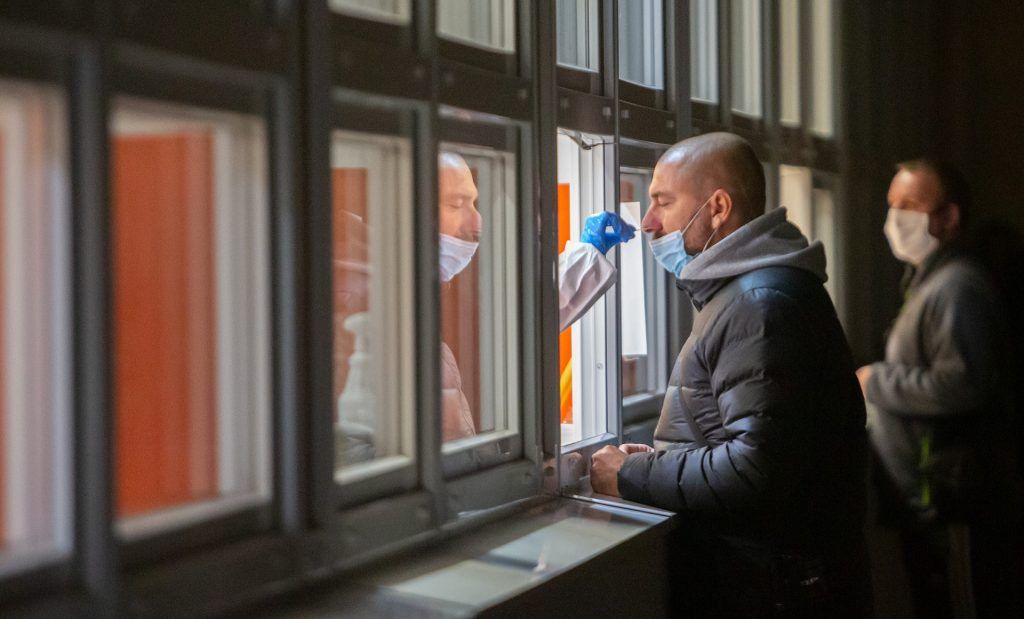How long will it take to develop and distribute vaccines against the omicron variant?
By Matt Field | December 1, 2021
 A coronavirus test. Credit: lukasmilan / pixabay.
A coronavirus test. Credit: lukasmilan / pixabay.
Talk about whiplash. After the first Thanksgiving Americans had spent together since the pandemic began, many began digesting alarming headlines about omicron, the new COVID-19 virus variant with dozens of mutations. Will it evade the protection offered by current vaccines? Will it spread wildly like delta or peter out like the beta variant? While health officials still have much to learn about the new variant, pharmaceutical companies say they can crank out new vaccines, fast.
Pfizer, the maker of one prominent COVID-19 vaccine, said that if research, which should be available in the coming weeks, shows the variant escapes the protection of its vaccine, it could “produce a tailor-made vaccine against that variant in approximately 100 days, subject to regulatory approval,” according to a statement the company sent the Bulletin. A company official told the health and medicine news site Stat that Pfizer could be producing a billon doses of new vaccine a quarter by March. Moderna, another manufacturer of mRNA vaccines, said, it could produce new vaccines in early 2022, in large quantities.
Pfizer, Moderna, and AstraZeneca, which makes a viral-vector COVID-19 vaccine, have been “running dress rehearsals” for pushing out variant-specific vaccines. According to an October piece in Nature, they’ve conducted trials on vaccines designed against variants such as beta, which better evades vaccine protection than others. Notably they’ve also thought about how those new vaccines might go through the regulatory approval process. While the initial steps of designing and synthesizing a new mRNA vaccine could take only days and, as company officials have said, producing new shots in large quantities could be done in months, it remains unclear exactly how those new vaccines would be cleared for public use.
Producing the current COVID-19 vaccines began in January 2020, when the SARS-CoV-2 genome was sequenced. It wasn’t until December of that year when US federal regulators authorized the first shots—record speed for vaccines, which had taken years to develop and test in the past. The initial vaccines went through three stages of clinical testing on people, including large phase III trials that included tens of thousands of participants. Only after that point did US regulators authorize the vaccines.
Big clinical trials take time and could be difficult to conduct for an omicron vaccine. After all, some people might hesitate to take an experimental vaccine when alternatives exist. Pfizer chief scientist Mikael Dolsten told Stat that, based on conversations with the Food and Drug Administration (FDA), it’s not clear whether new clinical trials will be necessary. The FDA did not respond to questions about whether this would be the case.
Other analyses could be used to determine whether new COVID-19 vaccines will be effective without conducting large-scale human trials. Dolsten told Stat a small trial that assesses safety and immune response could be completed in a month.
So far omicron has been found in more than 20 countries, including the United States. Some experts say areas with low vaccination rates are breeding grounds for new variants. Even if Pfizer can produce new formulations for omicron or other variants quickly, governments have to figure out how to get them into the arms of the hesitant in countries with vaccine supplies, and into countries where vaccines have been slow to arrive, as has been the case in much of Africa. Otherwise, the world could be stuck playing variant whack-a-mole for the foreseeable future.
Together, we make the world safer.
The Bulletin elevates expert voices above the noise. But as an independent nonprofit organization, our operations depend on the support of readers like you. Help us continue to deliver quality journalism that holds leaders accountable. Your support of our work at any level is important. In return, we promise our coverage will be understandable, influential, vigilant, solution-oriented, and fair-minded. Together we can make a difference.
Keywords: COVID-19 vaccines, omicron
Topics: Analysis, Disruptive Technologies















Because influenza mutates even more rapidly than covid or any other virus, NEW influenza vaccines are administered worldwide every year to cover new serotypes. Pfizer, Moderna, and others have routinely exceeded development and production goals this year for Covid vaccines. For accelerated approval, data to show that the new vaccine is effective at disease prevention is not required as the “parent” vaccine is so effective; only data that the new vaccine leads human vaccine recipients to make antibodies to the new Covid Omicron & Delta variants.. Ideally that testing should take only 6-7 weeks. This year the new influenza vaccine… Read more »